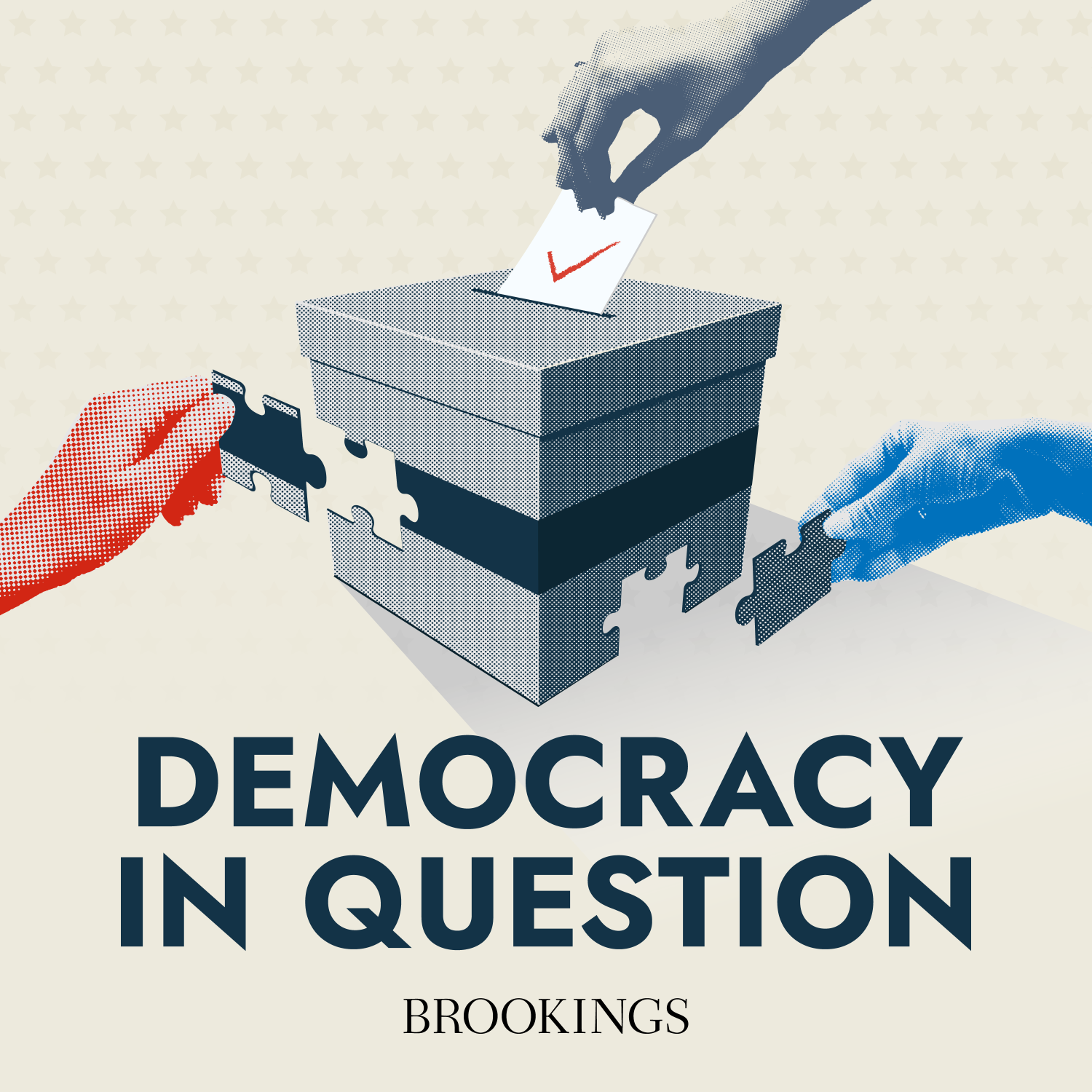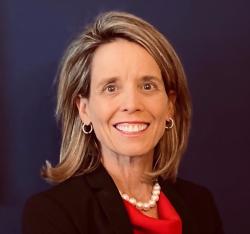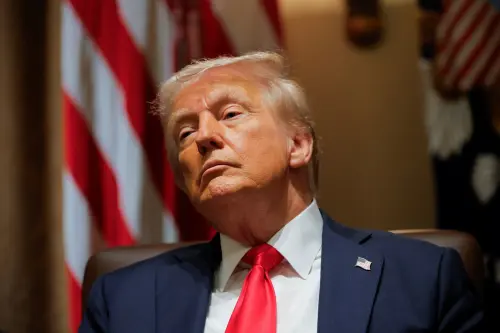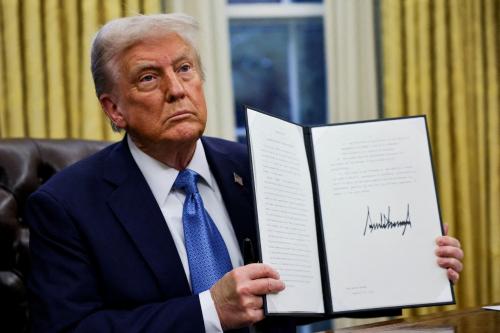I am also concerned that some of the actions will be drawing away our pipeline of future talent, so things like restricting student visas and workplace visas...that means that not only will we not have a lot of immigrants coming in in 2025, but potentially that could have implications for the next 10 or 20 years because people who would have come here to go to college, for example, will instead go somewhere else and then we won’t have them as part of our community.
Tara Watson
Immigrants are vital to American democracy and economic prosperity, especially as population growth among U.S.-born citizens dwindles. In this episode, host Katie Dunn Tenpas speaks with Tara Watson, director of the Center for Economic Security and Opportunity and a senior fellow in Economic Studies at Brookings. Together, they unpack recent immigration policy changes by the Trump administration, from the tightening of pathways to citizenship to the more aggressive deportation agenda, discussing how these changes might affect the number of immigrants coming to the U.S. and their long-term economic consequences.
- Listen to Democracy in Question on Apple, Spotify, or wherever you like to get podcasts.
- Watch episodes on YouTube.
- Learn about other Brookings podcasts from the Brookings Podcast Network.
- Sign up for the podcasts newsletter for occasional updates on featured episodes and new shows.
- Send feedback email to [email protected].
Transcript
[music]
TENPAS: Hi, I’m Katie Dunn Tenpas, a visiting fellow in Governance Studies at the Brookings Institution and director of the Katzmann Initiative on Improving Interbranch Relations and Government. And this is season two of Democracy in Question, a podcast where we examine current events through the lens of America’s political foundations, thinking about how recent events fit into the broader stream of democracy that runs throughout our history. You can find episodes of this podcast at Brookings dot edu slash Democracy in Question. All one word.
On today’s episode, I’m posing the question, do immigrants enrich democracy? Throughout our history, successive waves of immigrants have transformed and challenged the nation. Of course, neither Native Americans nor the enslaved Africans forcibly brought here can be called immigrants—and both deserve their own attention. But especially during the 19th century onward, new arrivals from abroad have shaped and reshaped American demographics, society, and politics.
With each new wave came new legislation, some welcoming of immigrants, and other laws far more restrictive. The 1790 Naturalization Act set the first rules for who would become a U.S. citizen. And many laws have passed since, determining who is granted citizenship and who is not.
Recent actions by the Trump administration have dramatically reshaped immigration policy. Challenges to birthright citizenship, controversial deportations, and the invocation of the Alien Enemies Act of 1798 have raised constitutional concerns, disrupted the economy, and called into question the future of immigration in America.
In this episode, we’ll explore how immigration policy has evolved over time and examine how immigrants have shaped America as we know it today, contributing to both economic growth and to the strength of our democratic institutions. I’m eager to welcome Tara Watson, an economist focusing on U.S. social policy with interests in immigration, health, and the safety net. She’s the director of the Center for Economic Security and Opportunity and a senior fellow in Economic Studies at Brookings.
Tara, welcome to the program. I’m so excited to talk to you about what we’re seeing today when it comes to immigration policy and how this relates to opportunity in the United States. I understand that you’re an economist by training, and so maybe we could start there, and you could sort of tell us how immigrants have enriched democracy from that perspective. And then I’m happy to sort of have a much broader discussion about how they enrich democracy.
[2:59]
WATSON: Thanks, Katie, for having me on and I’m always happy to talk about the role that immigrants play in our economy and our society more broadly. About 14 or 15 percent of people living in the U.S. were born outside the U.S. That includes a mix of people who have become citizens, people who are here as legal permanent residents, people who are on a temporary status or in some cases what we call a twilight status. And then what I think of as the truly traditional undocumented who have no legal status at all.
And all of those groups, I would say, are a net positive for the economy. When you think about our labor force, immigrants are hugely important, not only in some sectors that we’ve all heard about, like construction, agriculture, medicine, but also as consumers. And so when we look at the role that immigrants play in the economy, especially in an era where we don’t have much population growth coming from our own fertility in the U.S., among U.S. born people, immigrants are really critical to our future economic prosperity.
TENPAS: I’m curious about whether certain sectors of the economy are more reliant on immigrants as employees than other, and if you could just talk generally about the variations across the entire economy.
[4:24]
WATSON: Sure. Of course, there are industries where immigrants are especially important in terms of their workforce participation, so we can think about agriculture as a major example where most of the people who are doing low-level labor-type jobs in agriculture are foreign-born in the U.S. And there are certain parts of the agricultural industry that just could not survive without that labor. The U.S.-born population would not be willing to do it at a wage, which would allow those industries to be profitable. So it’s critically important in agriculture.
Immigrants are very disproportionately represented in construction, which of course has implications for housing—a key policy issue that we’ve been thinking about.
There’s also a preponderance of foreign-born workers in the tech industry and other knowledge-generation industries. So immigrants are much more likely to have Ph.D.’s or other advanced degrees and to be at the forefront of science and technology. We see more patents coming from immigrants than from U.S.-born people. And we actually see that when immigrants are in an area or in a firm, U.S.-born people are also more productive and producing more patents. So it’s not just that immigrants are doing this work, but they’re actually having positive spillovers on the work that American-born people can do.
TENPAS: Do you think we could go back in history a little bit and maybe you could tell me about certain eras and over time what sectors have they moved from, what sectors have been moved towards, or has it always been the same?
[5:54]
WATSON: We’ve seen eras over the course of American history where we’ve had a lot of immigrants and other eras where we’ve had many fewer immigrants. So, around 1900 we had a very large fraction of the population foreign born, about the same level that we have now. And at that time, immigrants were involved in all kinds of low-skill labor. But the difference around 1900 compared to now is that most of the labor force was not very well educated, and so immigrants were not as different from the typical U.S.-born person.
If we fast forward to today, there are many immigrants who come to the U.S. with maybe just a high school degree, maybe less than a high-school degree. And in that way, they are different from the typical U.S.-born person. There are more people who are foreign born without say a high school degree, they’re also more people that are foreign born with an advanced degree. So we sort of see this spreading out across the educational distribution. And so then that has implications for the types of jobs that people have. They tend to be involved in either very low-wage work or very high-end work.
TENPAS: So is it fair to say that education is sort of a predominant factor in determining kind of the range of jobs that immigrants will take, and that’s what’s really affected their entry into various sectors in the American economy?
[7:16]
WATSON: I think that’s a big part of it. Most immigrants do come here for the job opportunities that are here. And so economists have found that immigrants are very willing to both move geographically and move industry or occupation in order to meet demand, local demand. And so if there’s a chicken processing plant that needs workers, it’s very likely that you will see immigrants show up and be willing to do that work. And that could be in Georgia, where there hadn’t previously been a big immigrant community.
So really, I would say immigrants are both more flexible in terms of the types of jobs that they’re willing to take on, on average. And they fill in some places where we don’t have that much representation in the U.S.-born workforce in terms of educational background and skill background.
TENPAS: And this is somewhat different from your focus on the economics of it, but do you find that among these sectors where they tend to gravitate, are any of those groups lobbying or organizing in ways to continue the flow of immigrants to be able to work in their sectors? I’ve noticed that you’ve written some really interesting pieces about the first 100 days of immigration under the second Trump administration. And you’ve also written about reconciliation provisions and how they affect immigrant families. So you clearly are up to date on how the new president is impacting it. And so could you talk a little bit about that and maybe whether it will cause these business groups to actually organize and lobby?
[8:44]
WATSON: Sure, I will say I try to stay up to date. I view that as an important part of my job. It’s pretty hard in the current environment, as we all know, to know exactly what’s going on, changes hour to hour. But the Trump administration has done a lot to change the way we have approached immigration policy as a as a country. And I think the reason that that’s been possible is because Congress really has done very little in the past 30 plus years to address immigration. There’s been a need for immigration reform in terms of the way that we approach legal migration in the country, and I would argue also a need for rethinking the way we approach informal flows, people crossing the border.
And those things just have not happened. There have been some attempts that failed over the past 30 years. But we’re basically stuck with a 1990 version of what we thought immigration was all about. The economy has doubled since then in real terms and so we have this woefully out-of-date legislative approach on the books. And so each president brings their own view into how immigration policy should actually play out on the ground. And so we’ve seen that not just from Trump but from I would argue every president that in recent memory has really put their own imprint on the immigration situation.
So if we now think about, going back to your question with the business interest, if you talk to people behind closed doors in Washington or in the rest of the country, they will often say they’re concerned about the approach the Trump administration has taken with regard to immigration. So things like slowing down of legal pathways to migration, either temporary or permanent, is one bucket. Also, restrictions on undocumented flows, so closing the border, which I would argue Trump has more or less accomplished. So there’ll be many fewer people coming in across the border than there were, especially over the past few years. And also the deportations and raids that have been happening and seem to be accelerating recently. Those, of course, put pressure on business owners that employ undocumented workers.
All of this together creates hardship for businesses that rely on this workforce. And it’s both businesses that rely on undocumented workers in particular but also businesses that employ people who might be targeted by an immigration raid even though they have legal status or who might not be targeted directly but maybe a family member or friend is at risk and that person then decides to stay home because they’re nervous.
So we do have a business interest in addressing this issue in a different way than the current administration is addressing it. However, I’ve been surprised that there have not been a lot of vocal public statements about it. I think as in many other arenas businesses are a little bit hesitant to be confrontational about this issue with the administration for fear of retaliation. And so there just hasn’t been as much activity.
I will say though that it’s not just in this moment with this administration. I’ve been surprised over the past five years or so about the disconnect between what I hear business leaders saying in private and the degree to which they’re out in front of, you know, the public saying this is really important to us.
TENPAS: Just to latch onto that last statement, the mismatch between what they say in public and private. So they’re not as vehement about their dissatisfaction with the current state of it in public, but they will let you know that it’s really hurting them or is that what you meant?
[12:20]
WATSON: Yes. Yes, I think it’s well understood that immigrants are very important to U.S. business productivity and growth. And so you hear concerns, for example, in the tech sector, if the administration chooses to restrict employment-based visas, that could really hamper the growth of our tech sector. It could possibly allow the locus of tech development in the world to move out of Silicon Valley to Europe or China. And there’s a really serious threat there. And I think there is some lobbying going on behind the scenes, but you don’t see as much of it in public.
TENPAS: And you mentioned that the role of Congress is really, in part, it’s to blame because their inability to create legislation that matches modern immigration needs and demands is not keeping up. I’m just wondering if we could go back to the fall of 2024 when there was that immigration bill. Let’s just say, hypothetically, that that had passed. Where would we be now?
[13:24]
WATSON: It’s a great question. It’s hard to know what would happen in parallel universe. That bill I would say was quite conservative relative to the types of legislation that had been discussed over the past decade or so. But Democrats I think were willing to go along with it because they saw the levels of immigration that was happening at the southern border as a real political threat, which I think turned out to be an accurate way of reading the situation. And they wanted to be seen as doing something about it. But it was tough because the bill was pretty far to the right compared to what would have been viewed as a compromise bill, say in 2013 when another bill was passed.
So that could have passed. I think Trump’s political instincts were probably right not to let that pass because it would have taken a lot of the wind out of the sails of the Republican argument that Democrats weren’t willing to do anything to control immigration. So we would have probably seen, you know, restricted migration earlier than we saw. And I don’t know for sure whether it would have made a difference in the election outcome. It’s really hard to say.
But it certainly would have been a step towards getting Congress to get back in the game. And at the time, even though I was not a big fan of certain provisions of the bill, many of the provisions of bill in fact, I think it was just so important for Congress to exercise that muscle that I said it’s just better to pass something and then, you know, let’s get engaged in this debate again and then we can maybe, you know, fix it next time we have the opportunity.
But I think the vacuum is really damaging because it means every time a different president comes in, we have a complete overhaul of the system that’s really unfair to immigrants who have come under one set of expectations, and they’re radically changed. But it also gives, I think, American citizens the sense that we don’t know what we’re doing, we’re constantly flip-flopping, the system is out of control.
So, I think having a more nuanced and middle ground approach would go a long way to allowing citizens to feel like, all right, we’ve taken care of this issue. I may not agree with everything that we’ve decided collectively, but at least we’re sort of addressing it.
TENPAS: And just to take our conversation back to democracy, what is it about the role of immigrants just generally in our society that helps enrich and strengthen democracy?
[15:56]
WATSON: Democracy obviously is a coming together of disparate people with different views to try to make common decisions about things that affect all of us. And so immigrants are 14 or 15 percent of our population. They are obviously just a key part of our collective decision-making because of that. Many immigrants are here for decades and have a vested interest in the decisions that we make as a society. So there’s just that basic way in which immigrants are part of our democracy.
I think in recent months we’ve seen immigration and immigrants in particular be a testing ground for some theories of democracy. And I think a reason for that is that it is true that non-citizen immigrants don’t have all the same right as a U.S. citizen. And so when you have someone with authoritarian tendencies come into power, it’s a natural place to start testing the boundaries of how far can I go, how far I can go with this group that has some rights, but not quite as many rights as U.S. citizens have? And then, there’s a little bit of a I’ll push it a little further, I’ll put it a little further until I get to a point where now those rights have been seen as up for grabs enough that maybe I can also start questioning whether citizens should have those rights.
TENPAS: And going forward, what does your research agenda entail on this topic, and what are you watching?
[17:27]
WATSON: The main thing I’m working on right at the moment is trying to understand how all of these policy changes that have taken place since Trump took office will affect just the sheer number of people coming to the country, which is harder to measure than you might think, because we don’t have great records of migration in real time. And we of course don’t know exactly how the rest of the year will play out.
But that work suggests to me that we will go probably to a situation where we have somewhere in the neighborhood of net zero migration for the year, calendar year ‘25. And so what that means is we would have about as many people leaving as we would have coming. And to give you a reference point, it’s usually around a million a year. It went up to probably over 3 million a year during 2023.
And so this zero migration, if that is indeed what happens, would be, I don’t know if it’s literally unprecedented, but it certainly has been decades since we’ve seen anything like that. We always have people moving in and out, but because we have so few people coming in and as the deportations ramp up and people voluntarily leave, the balance will be changing and that will of course have implications for economic growth, and I think for the way we view ourselves as a society as being a place for immigrants to thrive.
TENPAS: Are there any other times that you can remember in American history where we’ve been at this juncture where there could be zero growth and where there could be some pretty serious economic repercussions from it?
[19:05]
WATSON: We don’t have great annual data going back in time, but the closest parallel would be probably during the Eisenhower era where mass deportations were carried out. And it’s believed about a million people were deported during that effort. I don’t know that we’ll get to a million during, you know, say this year of the Trump administration, but that would be the closest thing.
What you see when that happens in general is that you’re going to have fewer people, but a difference between that time and this time is that we also don’t have many young adults entering the workforce in the U.S. because fewer people have been born. And so the growth that we need in our labor force every year in order to fill the jobs of people who are leaving for retirement just isn’t going to be there. So we’ll probably see slower job growth numbers of the type that you hear about on a monthly basis on the radio and slower GDP growth.
And I am also concerned that some of the actions will be drawing away our pipeline of future talent, so things like restricting student visas and workplace visas. The workplace, it’s a little bit unclear how far they’re gonna go with that, but the student visas seem to be in jeopardy. And that means that not only will we not have a lot of immigrants coming in in 2025, but potentially that could have implications for the next 10 or 20 years because people who would have come here to go to college, for example, will instead go somewhere else and then we won’t have them as part of our community.
TENPAS: Wow, that’s a fascinating overview. I sort of want to switch gears at this point and ask you my closing question that I ask everybody. And it just draws us back to this topic of American democracy. And if you were teaching high school students about democracy, what is one lesson that you’d want them to leave your classroom with?
[21:03]
WATSON: I think in our current environment, it’s easy to have the courage of your convictions, but sometimes the way that’s translated is go and post something on social media about what you think. And I don’t want to discourage anyone from doing that, but I don’t think that’s enough, and I would like to see not just young people, but young people and the rest of us, think about ways to be more productively engaged in democracy. And to me, I think we don’t have enough listening going on. And it can be very difficult in a polarized climate to listen to someone who has said something that you very vehemently disagree with, or to listen to someone who has said something hurtful or hateful.
But all of the policies that we have in these collective decisions that we’ve made come out of somewhere. They came from people bringing their different viewpoints. And so you don’t have to agree with the people on the other side of a particular issue, but it’s very helpful to understand why they are coming to the table with that point of view because maybe there’s a way to address their concern without implementing the policy that you don’t want to see implemented. Maybe there’s another solution that you could come to if you had a better understanding of where that deeply held position was coming from.
So my advice is to just try to also listen even as you stand up for what you believe in and try to make a difference. And I do think it’s very important to be engaged because there aren’t really adults in the room and so at the end of the day, the democracy is just the people and so what the people demand is ultimately what will happen.
TENPAS: Yeah, and I think it’s easy—just this is my armchair psychology—but I do think it is easy to take for granted. And it’s really not just about voting, it’s about much more than voting and participating in ways where you can sort of voice your opinions.
[music]
I really hope to have you back in the future though too. I really have learned so much about the impact of immigrants in our democracy and your economic perspective and expertise is really interesting and helpful. So thank you so much for being part of our show today.
WATSON: Thank you for having me.
TENPAS: Democracy in Question is a production of the Brookings Podcast Network. Thank you for listening. And thank you to my guests for sharing their time and expertise on this podcast.
Also, thanks to the team that makes this podcast possible, including Fred Dews, producer; Daniel Morales, video manager; Steve Cameron, audio engineer; the team in Governance Studies including associate producer Adelle Patten, plus Antonio Saadipour and Tara Moulson; and our government affairs and promotion colleagues in the Office of Communications at Brookings. Shavanthi Mendis designed the beautiful logo and show art.
You can find episodes of Democracy in Question wherever you like to get your podcasts and learn more about the show on our website at Brookings dot edu slash Democracy in Question, all one word.
I’m Katie Dunn Tenpas. Thank you for listening.
The Brookings Institution is committed to quality, independence, and impact.
We are supported by a diverse array of funders. In line with our values and policies, each Brookings publication represents the sole views of its author(s).








Commentary
PodcastDo immigrants enrich democracy?
Listen on
Democracy in Question
June 19, 2025